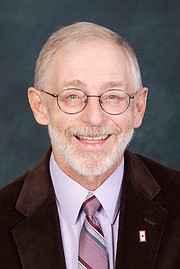Council debates, shoots down urban renewal change
COEUR d’ALENE — A City Council member’s plan to amend Coeur d’Alene’s urban renewal process was shot down this week by fellow councilors.
Dan Gookin wanted to limit the flexibility of the city’s urban renewal agency by requiring it turn over assets to the city once an urban renewal district expires.
Current revisions in Idaho law allow urban renewal agencies, such as Coeur d’Alene’s ignite cda, to indefinitely keep assets, or properties, that were inside an existing urban renewal district long after the urban renewal district dissolves.
Gookin said the current law defies the urban renewal purpose of revitalizing blighted areas using tax money — through tax increment financing — and leaving once the job has been completed.
In addition, because urban renewal agencies are run by trustees, not elected by the public, taxpayer-purchased assets end up being administered by quasi-government boards, Gookin said.
“It creates an agency not directly accountable to the public, acting like a business,” Gookin said. “We want private industry to run things, not the government.”
Gookin was alone, however, in his bid for an amendment. The remaining council members — councilor Woody McEvers was absent — voted to allow ignite cda to keep and collect rent on buildings inside a district that no longer exists.
“The agency may retain assets as long as the agency has resources other than tax increment to operate and manage such assets,” according to the latest revision. Any properties an agency keeps must generate income.
Former attorney turned activist David Lyons advised the council to follow Gookin’s suggestion to amend the revision.
Calling the revision a “money laundering” scheme that allows ignite cda a loophole to hold onto properties in a district long after the district ends, instead of conveying them to the city, Lyons asked the council to uphold the spirit of urban renewal.
“No more loophole,” Lyons said. “Everything the agency has is either tax increment, or the fruit of tax increment. Ultimately, tax increment is its only source of money.”
Urban renewal districts are required by law to operate under a specific timeframe, Lyons said. The current revision distorts the law’s intent.
“Why does the statute bother to specify a max life for districts at all?” Lyons asked.
Council member Dan English, who sits on the 10-member ignite board along with Mayor Steve Widmyer, said the agency’s transparency is unequivocal, and the current revision provides flexibility in isolated situations.
“You can have a plan, but you can’t anticipate every action into the future,” English said.
Danielle Quade, an attorney for ignite cda, said in some cases the city may not want to be given assets left over after a district sunsets.
“There are instances where the city doesn’t want to be the owner or manager of a certain type of property,” Quade said.
A building, such as a business incubator, is an example of a property the city may not want to manage, Quade said.
“The city may not want to own and manage those leases,” Quade said. “They would prefer to have the agency continue to do that. I don’t think the agency has any intent to keep property.”



